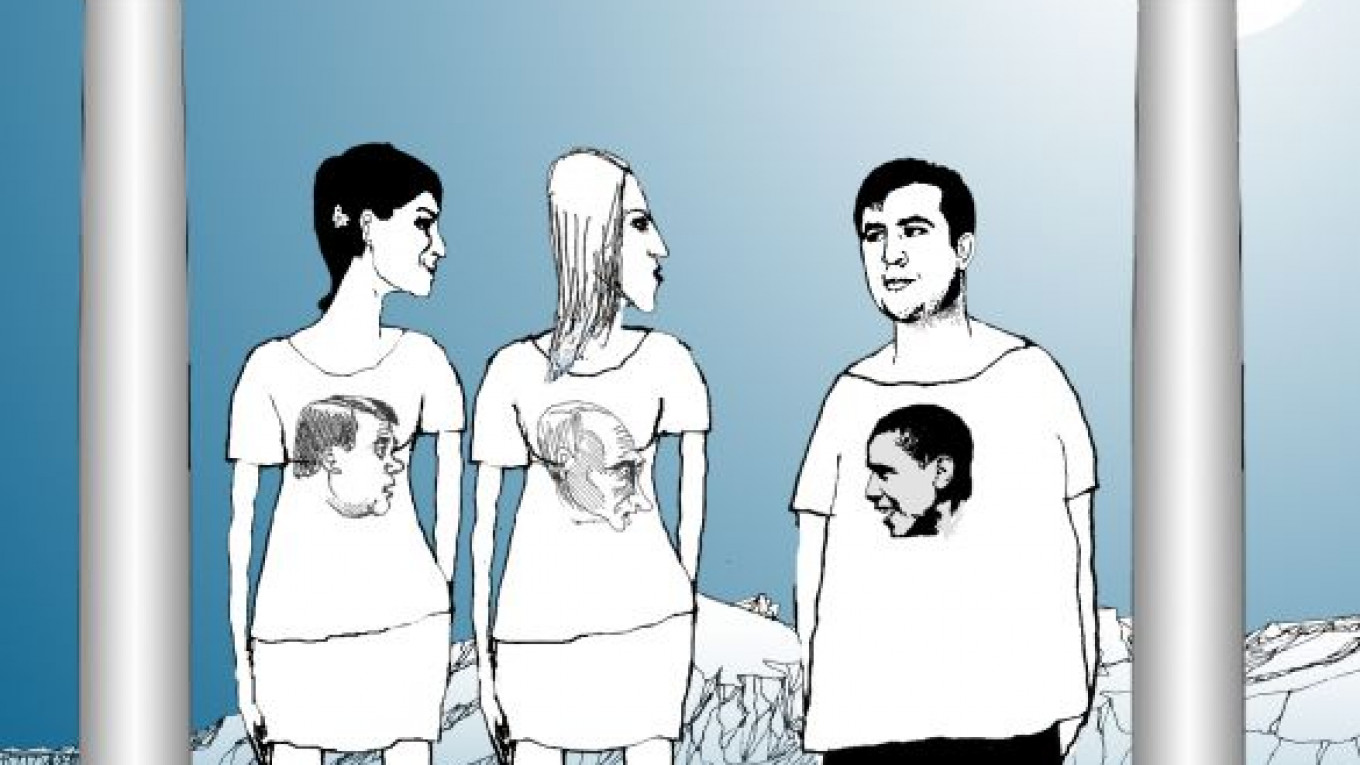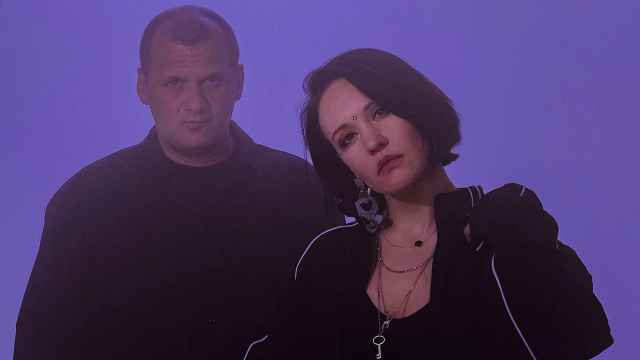In this month’s Russian GQ magazine, it-girl Ksenia Sobchak interviews Georgian President Mikheil Saakashvili, in his first meeting with Russian media since the 2008 war.
It’s an odd scenario, made even odder by Sobchak’s decision to wear a T-shirt with a portrait of Prime Minister Vladimir Putin. But the interview ends up somewhat swooning, after Saakashvili gives her a personal tour of his palace and whisks her off to Batumi in his personal jet.
Sobchak and journalist Ksenia Sokolova, who actually wrote up the interview, arrive at the presidential palace in Tbilisi dressed in tiny white mini-dresses and high heels. Saakashvili makes a good first impression. He is a “tall, cute man in a shirt with a democratically open collar,” Sokolova writes. He tells them that it’s too late for an interview but makes them an offer they can’t refuse: “Let’s look at my palace, and then fly with me to Batumi.”
Confirming Russia’s worst fears of U.S. expansionism, Saakashvili has a bust of Ronald Reagan in his office and a pair of box-fresh sneakers that were a present from former U.S. President George W. Bush. “They didn’t fit,” he admits.
Flying in his private jet to Batumi, Saakashvili drinks whiskey on the rocks — “Canadian-blended swill,” Sokolova writes — but fails to offer any to the women. He shows off his musical taste. It turns out that his favorite song is Nick Cave’s “Where the Wild Roses Grow.” He also regales them with a video of Chris de Burgh singing “Lady in Red” in Tbilisi.
When they get to the Black Sea resort of Batumi, Saakashvili amazes them with the palm trees along the esplanade — a present from a sheikh, he says — and with a tour of the luxury hotels being built along the beach.
“I last saw such a number of buildings under construction in Shanghai,” Sokolova writes. Showing a touch of humor about Russian rhetoric, Saakashvili explains that the buildings were funded by an “international conspiracy.”
For the interview itself, Sobchak turns up wearing a T-shirt with a huge portrait of Putin framed by a garland of flowers, from Russian designer Denis Simachev. A member of Saakashvili’s press service insists that she cover it up with a jacket. “People in our country really hate Putin. He gave the order to bomb us,” she says.
Saakashvili takes a more liberal attitude, however. “In a free country you can decide things like that yourself.”
They ask Saakashvili why he furiously chewed his tie in an infamous videoed incident during the war. “I’m so sick of that story of the tie,” he says. “Didn’t everyone chew their Young Pioneer ties?”
He also denies that he ever called Putin a “Lilliputian.” He describes the Russian prime minister, who once said he would string up Saakashvili by the balls, as having the mentality of a “street ringleader,” while he himself is a “straight-A student who gave him a kick in the ass.”
“The problem is, you don’t have pea-shooters, but howitzers and Grad rocket launchers, and thousands of people die,” Sobchak says of the schoolyard analogy.
They do ask some serious questions about the war and politics, while Saakashvili paints an idyllic picture of a country where policemen have nice uniforms and cars and are respected and where every school will have three native English teachers.
The most dubious question they ask is about television host Tina Kandelaki, who is of Georgian origin. She has claimed that Saakashvili personally dislikes her after she turned down his sexual advances.
“Kandelaki says she wouldn’t give it to you,” they tell Saakashvili. He calls this “rubbish.”
A Message from The Moscow Times:
Dear readers,
We are facing unprecedented challenges. Russia's Prosecutor General's Office has designated The Moscow Times as an "undesirable" organization, criminalizing our work and putting our staff at risk of prosecution. This follows our earlier unjust labeling as a "foreign agent."
These actions are direct attempts to silence independent journalism in Russia. The authorities claim our work "discredits the decisions of the Russian leadership." We see things differently: we strive to provide accurate, unbiased reporting on Russia.
We, the journalists of The Moscow Times, refuse to be silenced. But to continue our work, we need your help.
Your support, no matter how small, makes a world of difference. If you can, please support us monthly starting from just $2. It's quick to set up, and every contribution makes a significant impact.
By supporting The Moscow Times, you're defending open, independent journalism in the face of repression. Thank you for standing with us.
Remind me later.






